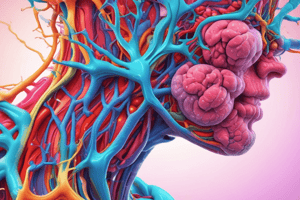Podcast
Questions and Answers
What is the primary cause of excessive aldosterone secretion in primary hyperaldosteronism (Conn's syndrome)?
What is the primary cause of excessive aldosterone secretion in primary hyperaldosteronism (Conn's syndrome)?
- A catecholamine-producing tumor in the adrenal medulla
- Cushing's syndrome resulting from glucocorticoid therapy
- High levels of angiotensin II stimulated by plasma renin
- A benign adrenal adenoma or tumor (correct)
Which of the following is NOT a common problem associated with increased aldosterone levels in hyperaldosteronism?
Which of the following is NOT a common problem associated with increased aldosterone levels in hyperaldosteronism?
- Elevated blood pressure
- Metabolic acidosis (correct)
- Hypernatremia (high sodium levels)
- Hypokalemia (low potassium levels)
What is the primary treatment for early hyperaldosteronism?
What is the primary treatment for early hyperaldosteronism?
- Surgical removal of one or both adrenal glands (correct)
- 24-hour urine collection test
- Gradual tapering of corticosteroid drugs
- Lifelong hormone replacement therapy
Which of the following is a characteristic symptom of a pheochromocytoma?
Which of the following is a characteristic symptom of a pheochromocytoma?
Which diagnostic test is most commonly used to detect a pheochromocytoma?
Which diagnostic test is most commonly used to detect a pheochromocytoma?
Which of the following statements about patient education for hyperaldosteronism is TRUE?
Which of the following statements about patient education for hyperaldosteronism is TRUE?
Which of the following is a potential complication of pheochromocytoma surgery?
Which of the following is a potential complication of pheochromocytoma surgery?
What is the primary cause of secondary hyperaldosteronism?
What is the primary cause of secondary hyperaldosteronism?
Which patient group is at the highest risk for acute adrenal insufficiency?
Which patient group is at the highest risk for acute adrenal insufficiency?
Which of the following statements about patient education for hyperaldosteronism is FALSE?
Which of the following statements about patient education for hyperaldosteronism is FALSE?
Flashcards are hidden until you start studying
Study Notes
Fluid and Electrolyte Balance
- Fluid and electrolyte balance is affected by hormones secreted from the pituitary gland and adrenal glands, which regulate cellular regulation.
- Disorders of the pituitary gland and adrenal glands can result in fluid and electrolyte imbalances.
Anterior Pituitary Gland
- The anterior pituitary gland controls growth, metabolic activity, and sexual development through the secretion of various hormones.
- Hormones secreted by the anterior pituitary gland include:
- Growth hormone (GH)
- Thyrotropin (TSH)
- Corticotropin (ACTH)
- Follicle-stimulating hormone (FSH)
- Luteinizing hormone (LH)
- Melanocyte-stimulating hormone (MSH)
- Prolactin (PRL)
Hypopituitarism
- Hypopituitarism is a condition where the anterior pituitary gland undersecretes one or more hormones.
- Causes of hypopituitarism include:
- Primary pituitary dysfunction
- Problems in the hypothalamus affecting anterior pituitary function
- Symptoms of hypopituitarism include:
- Metabolic problems
- Sexual dysfunction
- Management of hypopituitarism involves hormone replacement therapy.
Hyperpituitarism
- Hyperpituitarism is a condition where the anterior pituitary gland oversecretes hormones.
- Causes of hyperpituitarism include:
- Tumors or hyperplasia
- Symptoms of hyperpituitarism include:
- Headache
- Visual changes
- Increased intracranial pressure
- Management of hyperpituitarism involves:
- Suppressing hormone levels
- Reducing symptoms
- Preventing complications
Disorders of the Posterior Pituitary Gland
- Disorders of the posterior pituitary gland affect the hormone vasopressin (ADH).
- Diabetes insipidus (DI) is a condition where the posterior pituitary gland undersecretes ADH.
- Symptoms of DI include:
- Polyuria
- Dehydration
- Disturbed fluid and electrolyte balance
- Management of DI involves:
- Desmopressin (DDAVP) therapy
- Monitoring fluid intake and output
- Syndrome of Inappropriate Antidiuretic Hormone (SIADH) is a condition where the posterior pituitary gland oversecretes ADH.
- Symptoms of SIADH include:
- Water retention
- Dilutional hyponatremia
- Fluid overload
- Management of SIADH involves:
- Fluid restriction
- Promoting water excretion
- Replacing lost sodium
Disorders of the Adrenal Gland
- Adrenal gland hypofunction can result in adrenal insufficiency.
- Symptoms of adrenal insufficiency include:
- Anorexia
- Nausea
- Vomiting
- Diarrhea
- Abdominal pain
- Weight loss
- Management of adrenal insufficiency involves:
- Hormone replacement therapy
- Monitoring for fluid deficit and hyperkalemia
- Adrenal gland hyperfunction can result in hypercortisolism (Cushing's disease).
- Symptoms of Cushing's disease include:
- Fat pads on the neck, back, and shoulders
- Enlarged trunk with thin arms and legs
- Round face (moon face)
- Cardiac changes
- Emotional lability
- Mood swings
- Management of Cushing's disease involves:
- Reducing plasma cortisol levels
- Removing tumors
- Restoring normal body appearance
- Adrenal gland hyperfunction can also result in hyperaldosteronism (Conn's syndrome).
- Symptoms of hyperaldosteronism include:
- Hypernatremia
- Hypokalemia
- Metabolic alkalosis
- Elevated blood pressure
- Management of hyperaldosteronism involves:
- Surgical removal of one or both adrenal glands
- Potassium replacement therapy
- Pheochromocytoma is a catecholamine-producing tumor that arises in the adrenal medulla.
- Symptoms of pheochromocytoma include:
- Intermittent episodes of hypertension
- Headaches
- Palpitations
- Profuse diaphoresis
- Flushing
- Apprehension
- Sense of impending doom
- Management of pheochromocytoma involves:
- Surgical removal of one or both adrenal glands
- Monitoring for hypertension
Studying That Suits You
Use AI to generate personalized quizzes and flashcards to suit your learning preferences.




